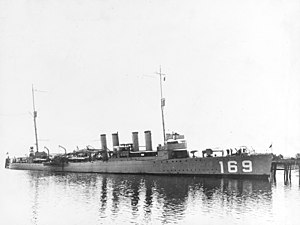USS Foote (DD-169)
 |
|
| History | |
|---|---|
|
|
|
| Name: | Foote |
| Namesake: | Andrew Hull Foote |
| Builder: | Fore River Shipbuilding Company, Quincy, Massachusetts |
| Laid down: | 7 August 1918 |
| Launched: | 14 December 1918 |
| Commissioned: |
|
| Struck: | 8 January 1941 |
| Fate: | Transferred to UK, 23 September 1940 |
|
|
|
| Name: | HMS Roxborough |
| Commissioned: | 23 September 1940 |
| Identification: | I07 |
| Fate: | Transferred to USSR, 1 August 1944 |
|
|
|
| Name: |
|
| Acquired: | 1 August 1944 |
| Fate: | Returned to UK, 7 February 1949 for scrapping, 14 May 1949 |
| General characteristics | |
| Class and type: | Wickes-class destroyer |
| Displacement: | 1,060 tons |
| Length: | 314 ft 5 in (95.83 m) |
| Beam: | 31 ft 8 in (9.65 m) |
| Draft: | 9 ft 2 in (2.79 m) |
| Speed: | 35 knots (65 km/h; 40 mph) |
| Complement: | 101 officers and enlisted |
| Armament: |
|
The second USS Foote (DD–169) was a Wickes-class destroyer in the United States Navy following World War I. She was transferred to the Royal Navy as HMS Roxborough (I07) and later to the Soviet Navy as Zhyostky (or Doblestny ; sources vary).
Named for Admiral Andrew Hull Foote, she was launched 14 December 1918 by Fore River Shipbuilding Company, Quincy, Massachusetts; sponsored by Mrs. Lelia F. Cady, daughter of Admiral Foote; and commissioned 21 March 1919, Lieutenant Commander D. H. Stuart in command.
Foote sailed from Boston 3 May 1919 to take up an observation station off Newfoundland for the historic first aerial crossing of the Atlantic, made later that month by Navy seaplanes. She returned to Boston 22 May to complete her interrupted fitting out, then took part in training operations until sailing from Newport 27 August bound for a tour of duty with Naval Forces European Waters. From September through December, she served in the Adriatic, and then called at Italian and French ports homeward bound. Arriving at Boston 12 February 1920, she was placed in reserve 24 February for repairs there and at Charleston.
In the summer of 1921, Foote operated with 50 percent of her complement during summer target practice in Narragansett Bay, and returning to Charleston, she lay there and at Boston for alterations and repairs until decommissioned at Philadelphia 6 July 1922. Recommissioned 2 July 1940, Foote operated on patrol out of Charleston, until sailing 7 September for Halifax, Nova Scotia. There, on 23 September 1940, she was decommissioned and transferred to the Royal Navy in the destroyers for land bases exchange.
...
Wikipedia
